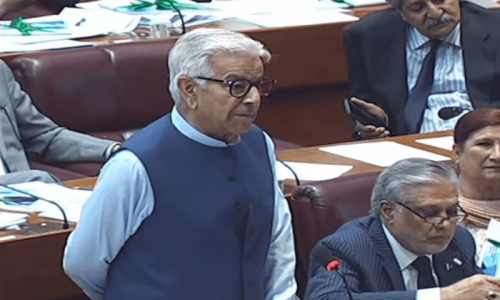• CJ Isa wonders why articles 62 and 63 suggest different punishments for same offence by lawmakers
• Counsel terms 2018 ruling ‘incorrect’, says Article 62 dependent on Article 63
• Bench intends to wrap up case by Jan 11, says SC only concerned with legality, not political parties
ISLAMABAD: As the apex court expressed its intention to wrap up the proceedings of a case regarding disqualification of lawmakers by Jan 11, Chief Justice Qazi Faez Isa on Tuesday questioned why two similarly worded provisions of the Constitution provided different punishments to parliamentarians for the same offence.
The CJP compared Article 62(1)(f) and Article 63(1)(g) and said the former entailed a lifetime ban whereas the latter prescribed a five-year ban from parliament.
The CJP wondered why these provisions prescribed different punishments, even for committing acts which may be “prejudicial to the ideology of Pakistan or against the sovereignty, integrity or security of the country”.
These observations were made by the top judge as a seven-member bench took up a set of 15 petitions to determine whether the disqualification period was five years or a lifetime ban. The Elections Act was amended to reduce it to five years after a Supreme Court judgement in 2018 introduced a life ban for lawmakers over violation of the said article.
The Supreme Court also appointed senior counsel Faisal Siddiqui, Uzair Karamat Bhandari, and legal adviser Reema Omar as amici to assist the court on the question of disqualification.
‘Court interested in 2018 verdict’
During the hearing, the court said it was more interested in arguments supporting the April 13, 2018 Supreme Court verdict in the Samiullah Baloch case which had shut the doors of parliament permanently for politicians disqualified under Article 62(1)(f).
Lawyer Makhdoom Ali Khan, representing Jehangir Khan Tareen who was also disqualified under Article 62(1)(f), apprised the court that provisions relating to qualification and disqualifications of parliamentarians were introduced in the Constitution under Presidential Order 14 of 1985 through the Revival of the Constitution Order (RCO) by late military dictator Ziaul Haq.
“Is it not ironic that a person who violated his oath and destroyed the Constitution by holding it in abeyance…put forth these conditions,” the CJP wondered. “Was Zia a non-profligate?”
“These are the matters of divine judgement,” the counsel said, adding that if an individual had committed treason he could be elected to parliament after five years.
“Did Ziaul Haq commit treason by holding the Constitution in abeyance,” wondered Justice Isa. “Could the constitution be amended through RCO? Ziaul Haq inserted the clauses on the character of individuals,” the CJP observed, also wondering whether Zia himself had a good character.
“This is ironic that those who come swearing to protect the Constitution break it themselves and then introduce amendments,” CJP Isa observed.
Justice Syed Mansoor Ali Shah, however, added that articles 62 and 63 got a stamp of approval through the 18th Amendment, which was a democratic dispensation.
CJP Isa observed he would choose provisions provided by the original and pristine Con-stitution not amended by dictators in case a conflict arose between the provisions.
Makhdoom Ali Khan cited the Al-Jihad case to highlight that the judgement itself suggested that in case of such a conflict, the provision suggested by the original constitution should prevail.
Makhdoom Ali Khan argued that both articles 62 and 63 were inserted in the Constitution at the same time; therefore, both should be considered in relation to each other.
The counsel contended that the Supreme Court had incorrectly decided the Samiullah Baloch case by looking at the two provisions through different lenses and added that Article 62 was dependent on Article 63.
About the declaration by the court of law as suggested by Article 62(1)(f), it should be looked at with the standard set out in Section 42 of the Special Relief Act, the counsel said, adding that a negative declaration by the court of law was impossible to obtain.
Attorney General for Pakistan (AGP) Mansoor Usman Awan supported Section 232(2) in the Election Act 2017 which prescribed disqualification for five years.
The AGP asked the court to revisit the Samiullah Baloch judgement since it contained certain contradictions. The advocates general also supported this contention.
According to the CJP, the Constitution did not mention the period of disqualification rather the gap was filled by the courts. Justice Shah wondered whether the period provided in sub-constitutional legislation — the Elections Act — was of greater importance than the Constitution. “This matter needed interpretation since under Article 63, a person who commits sedition could still contest the elections,” he added.
The chief justice wondered about the differences between articles 62 and 63 and asked how the character of an individual could be determined. “Your supporter may say you have an exemplary character while your detractors may say you have the worst,” he observed.
“According to Islamic teachings, no one can be said to have an exemplary character,” the CJP observed and added that even Quaid-i-Azam Mohammad Ali Jinnah would have faced disqualification according to these provisions.
He also observed that an impression should not be created that the case was being heard for or against a political party. “We are only concerned with the constitutionality and legality of the matter,” he stressed.
Published in Dawn, January 3rd, 2024













































Dear visitor, the comments section is undergoing an overhaul and will return soon.